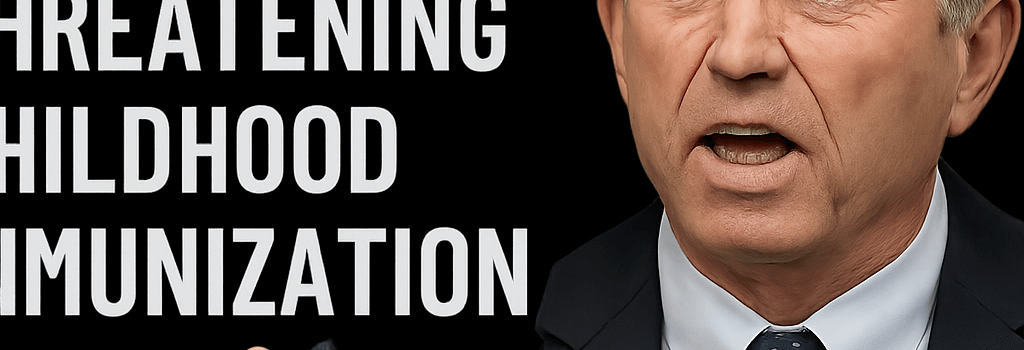RFK Jr. Fires ACIP Members, Threatening Childhood Immunization

Outrage and Institutional Response
The medical and public health communities are bracing for a coordinated campaign against federal vaccine recommendations after Health and Human Services Secretary Robert F. Kennedy Jr. abruptly dismissed all 17 members of the Advisory Committee on Immunization Practices (ACIP). Kennedy — a long-time vaccine skeptic without formal training in epidemiology or microbiology — announced the “complete overhaul” in a Wall Street Journal op-ed on June 9, 2025.
“These attacks against scientific standards and well-established processes culminated yesterday when Secretary Kennedy announced that he is firing all of the members … of ACIP.” — Anna Yousaf, CDC infectious disease researcher
Within hours, CDC staff rallied at its Atlanta headquarters, protesting cuts to funding, scientific censorship, and the dismantling of a committee that has guided U.S. immunization policy for six decades. At the American Medical Association’s annual meeting in Chicago, delegates passed an emergency resolution demanding an immediate reversal and launching an alternative advisory structure should ACIP’s integrity be compromised.
Technical Deep Dive: ACIP’s Workflow and Data Integrity
ACIP leverages the GRADE (Grading of Recommendations Assessment, Development and Evaluation) framework to synthesize evidence from randomized controlled trials, cohort studies, and post-licensure surveillance. Members undergo a multi-stage vetting process, including personal financial disclosures, automated conflict-of-interest checks via the CDC’s IntegrityBound system, and recusal mandates delivered through encrypted email channels integrated with the CDC’s Microsoft Azure environment.
Once convened, ACIP subcommittees tap into real-time data streams such as Vaccine Adverse Event Reporting System (VAERS), the CDC’s Data Lake on Amazon Web Services (AWS), and the V-Safe smartphone app APIs. Advanced statistical models, including hierarchical Bayesian meta-analyses, ensure robust safety assessments before recommendations ascend to HHS for final approval.
State-Level Fragmentation and Data Infrastructure Vulnerabilities
Even prior to the purge, at least five states had begun establishing independent immunization guidelines using cloud-based platforms like Salesforce Health Cloud and open-source registries based on the FHIR (Fast Healthcare Interoperability Resources) standard. Health data interoperability experts warn that replacing ACIP with ad hoc panels risks creating inconsistent vaccination schedules, undermining herd immunity thresholds — typically 92–95% for measles — and complicating digital certificate verification across state lines.
Impacts on Vaccine Development Pipeline
Beyond routine immunizations, ACIP’s strategic guidance influences federal funding allocations for novel vaccine technologies, including mRNA platforms, viral vector constructs, and nanoparticle adjuvants. Disruption to this advisory process could delay CDC purchase orders managed through the Defense Production Act Title 3 provisions, affecting domestic manufacturing capacity for influenza, RSV, and emerging coronavirus vaccines.
Expert Opinions on Long-Term Consequences
- Dr. Helen Chu, University of Washington: “Disbanding an evidence-based committee undermines global trust in U.S. vaccine safety standards. It sends conflicting signals to GAVI and WHO partners relying on ACIP’s technical reviews.”
- Dr. Aaron Milstin, Data Security Analyst: “Rapid reconstitution of ACIP without stringent vetting poses cybersecurity risks. Credentials provisioned in bulk could expose CDC systems to insider threats or supply-chain attacks.”
- Dr. Priya Desai, AMA Delegate: “We cannot afford to let political interference erode decades of public health gains. An independent, transparent advisory board is essential to uphold scientific rigor.”
International Repercussions
ACIP is often cited by the World Health Organization’s Strategic Advisory Group of Experts (SAGE) as a model. The suspension of its processes has prompted discussions in the European Medicines Agency (EMA) about reinforcing regional advisory capacities. Several African and Southeast Asian public health agencies are monitoring the situation, given their reliance on U.S. licensure metrics to shape local immunization rollouts.
Senate Oversight and Continued Controversy
Sen. Bill Cassidy (R-La.), who voted to confirm Kennedy after receiving assurances that he would not alter vaccine policy processes, now finds himself at odds with the new reality. Cassidy’s assurance letter focused on preserving the “mechanics” of ACIP meetings rather than safeguarding member selection. Late Tuesday, Cassidy reiterated he would continue oversight calls, but GOP and Democratic senators have expressed bipartisan concern over the abrupt staffing changes.
Path Forward and Critical Junctures
- HHS must clarify whether new appointees will respect GRADE methodology and maintain transparency in data sources.
- Congressional hearings, slated for early July, will examine the legal authority of the Secretary to override Federal Advisory Committee Act (FACA) stipulations.
- The AMA’s task force on alternative advisory structures is set to release a white paper outlining technical and governance frameworks by August.
As RFK Jr. prepares to announce replacements for ACIP in the coming days, public health stakeholders emphasize vigilance. The deployment of AI-powered pharmacovigilance tools, bolstered by machine learning anomaly detection on VAERS and V-Safe data, could mitigate some risks. However, the integrity of immunization policy ultimately hinges on an independent, expert-driven process — a standard now under threat.